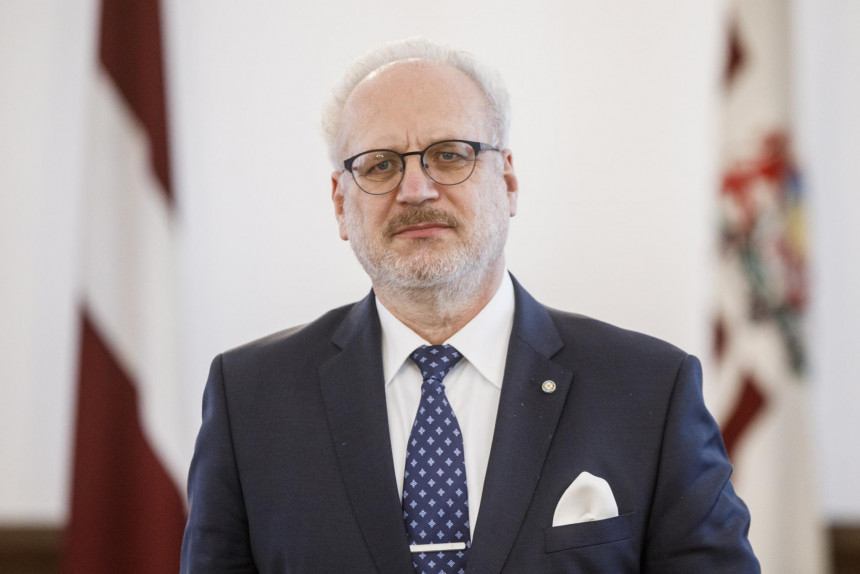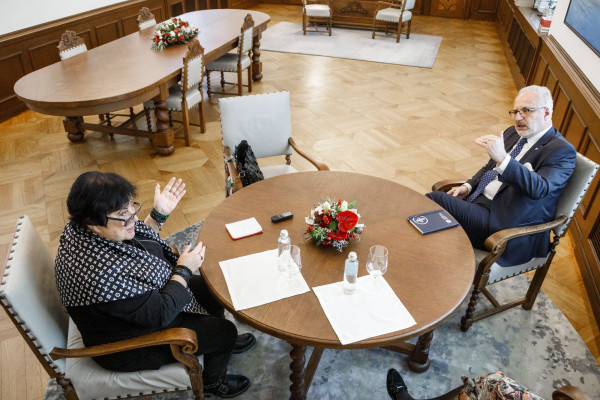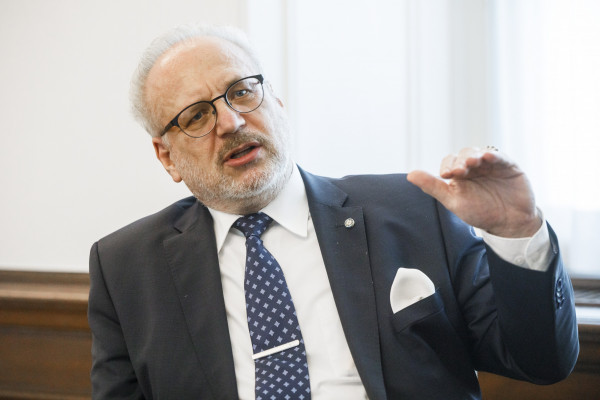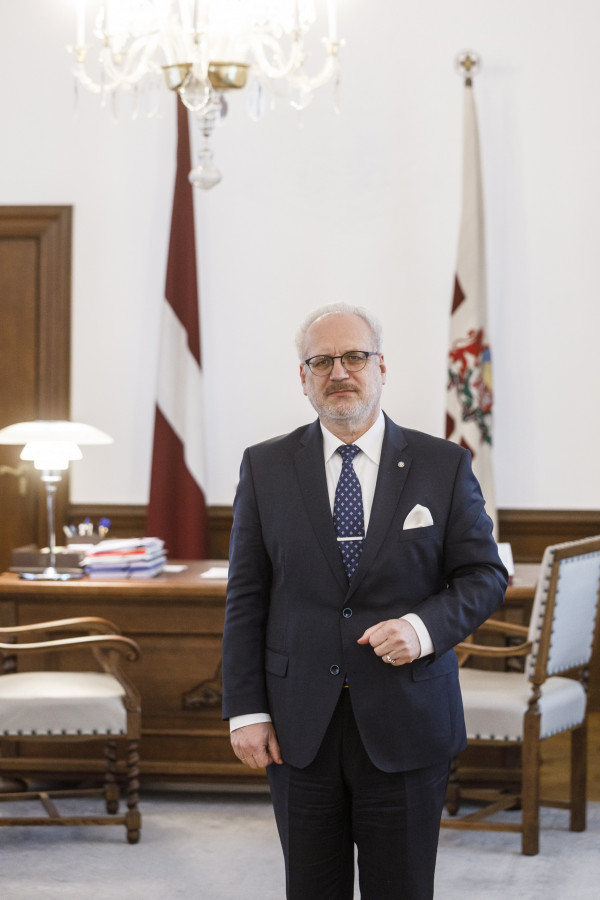President of Latvia: we will overcome the crisis next year

"I think I have become the president of the people. Let me explain why. The president of the people does not mean that everyone likes him. That is neither possible nor necessary. I have acted in the interests of society as a whole. The parties represent their own and their constituents' interests in the Saeima and the government, and the President represents the interests of all the people. My work is aimed at benefiting the whole nation, which is made up of very different people. Subjectively, I believe that I am the president of all people, but everyone can think differently,” says Egils Levits. Conversation with President Egils Levits during the week of our national celebrations.
Since 9 November, the country has once again been in a state of emergency. What do you think: has everything that the government decided to ban and which was approved by parliament been done correctly? Or - could something have been done differently?
First and foremost, these type of measures are needed to limit the spread of the pandemic, as it spreads through human contact. In my opinion, it is a misconception when we say - it is either the containment of the pandemic or the economy. If people are sick, it also affects the economy. We see that in countries with a high pandemic rate, the economic downturn is also deeper. Such restrictive measures are necessary to endure a couple of weeks and then we can loosen the reins.
A month, not a couple of weeks.
Possibly even longer. I think this is the right step, which has also been taken for the benefit of the economy.
Just look at what is happening in France or England, where it is not even possible to go outside normally: the economy there is much more stagnant than here. I would not wish to comment on one or another sector that is closed here, because it is more of a matter for the specialists. But when setting this type of restrictions, proportionality must be observed: one may ask why one measure is allowed and another is not, even though the number and intensity of contacts are the same. The importance of the relevant contacts in everyday life must also be taken into account.
Some conditions are quite interesting: at a funeral there should be no more than ten people, while up to 50 people can participate in demonstrations. Then maybe one should call it a demonstration instead of a funeral?
Yes, it can be debated and these norms can be criticized. But the basic principles must remain.
There is no doubt about that. But the food service companies were shut down immediately and all of them. The salary of civil servants will roll into their accounts on a certain date without delays, but what will the owners of restaurants, pubs, cafes do with their employees? Tell them to be patient? In addition, food service companies absolutely were not a hotbed of infections.
This must be looked at seperately. The government will decide on compensations. There should be an adequate support for this.
Let's stick to the word "should". But how do you assess the government's actions from the very beginning of the pandemic to the present?

There are three stages. Early stage, summer, and autumn. First of all, the beginning was adequate, appropriate to the situation, but the summer... Now we can see that the second wave is much stronger, but if there had been more control measures in the summer and stricter restrictions, then today we would not need measures as strict as are in place right now. Secondly - and you yourself wrote this - there had to be a plan in place to respond to one scenario or another. I have also pointed this out. In the end, the Ministry of Health prepared this plan. It was quite abstract, and now it is being made more specific. It's important for people to be able to plan their lives, not to announce on a Friday - your business will be closed on Monday or children won't go to school. If people could follow the development of the pandemic and the conditions for combating it ahead of time, they would be better prepared personally, better able to react to what is happening, and this would reduce stress.
The Ministry of Health blames the public for being undisciplined, says this is why Covid-19 infection is spreading so fast. If we are constantly restricted in some way, companies are closed, theaters are closed, then why are the borders not closed at the same time, for example, with Russia, where there are hundreds of thousands of covid-infected people, but who have the opportunity (and many use it) to come to Latvia? The arrivals are not checked, after all.
At least a formal obligation is there... They have to fill in the questionnaires, indicate the address where the person will be self-isolated. However, it is clear that more emphasis needs to be placed on effective control.
No matter how bad the pandemic is, it sheds light on many things. For example, political party funding. It was decided last year that parties would be financed from taxpayers' pockets. But against the background of a pandemic, party funding seems immoral.
It would be more immoral if the parties were funded by individual rich people.
Do you think that the rich do not fund parties now? The scandal in the party For Latvia's Development (Latvian: Latvijas attīstībai) seems to indicate that.
That is a criminal offense. The public must be aware that parties are part of democracy, we cannot do without parties. And they must be financed transparently, mainly from the state budget. That is why I generally support it. Already last year, when this decision was made, I was talking about what still needs to be adjusted. Unfortunately, this adjustment has not yet been made. First, public funding is proportional to the number of votes received in the election. That's the correct way. However, this funding needs to somehow "build in" a mechanic to reflect the party's development in the years following the elections. For example, a party that has received few votes still enters the Saeima and after a year becomes a strong, numerous party. This is shown by the ratings over a longer period of time, such as a year or at least half a year. This means that funding must go up. Conversely, if the importance of the party, the ratings fall for a long time, the funding must also decrease. In addition, the total amount allocated to all parties must remain the same.
Secondly, the distribution of funding must also include regional parties or electoral associations. At present, with the administrative-territorial reform (ATR), regional parties no longer really have a place. My proposal (unfortunately not accepted by the Saeima) was: regional parties or electoral associations should also be able to participate in municipal elections. Then they would also be entitled to a piece of party funding "cake". This would have been meaningful because people have different interests when voting at the municipal level than at the national level. Different interest coalitions are being formed compared to national level parties. If we look at perfecting democracy, that is a task that still needs to be done.
But to increase party funding six (!) times! It is not public money, because there is no such thing, it is just our taxpayers' money. Semi-scattered parties, such as Who owns the state? (Latvian: Kam pieder valsts?, KPV LV), will receive more than 600,000 euros every year. That is absurd.
That is why the mechanism I have just talked about needs to be put in place. But this is perfectly adequate, normal funding - as large as in Estonia and Lithuania. There it is accepted as normal, part of democracy. For us, the dependence of parties on the donations of selfish rich people has always been a problem. Therefore, public funding was needed. And yet, as I said, there is still work to be done: in many cases, our reforms and laws are not fully conceived, and this is a typical example.
It is not just party funding that seems immoral to many. Many also consider the tax reform, which is hastily being pushed under the guise of covid-crisis, to be a malicious action against Latvian taxpayers. Now that everyone is having a hard time, a tax reform is suddenly needed. Why?
In recent weeks, I have expressed the view that tax reform is necessary but not completely thought through. It is too rough. For example, it is currently unclear about people who earn less than € 500, whether they (or their employers) will have to pay up to € 170 in social security contributions, regardless of their real income. It also changes the labor market and labor relations, as part-time work is severely limited. And the question also arises: where will these people remain? Some, who were a part of the shadow economy will come out, the other - on the contrary - will hide. Is everything calculated and thought through? Today, there are many part-time jobs, many are working remotely, many are working for multiple employers, and these are modern trends. And the forthcoming reform is slowing down this trend greatly. But it is very important for people to choose: how and in what way to work? I understand the government's concern to get people out of the shadow economy, but we need to think about the right way to do it.
However, it is not yet felt that this tax reform will be done for the benefit of the people. Creative people find it especially painful. They will be simply robbed if nothing changes in this tax reform project.
Fortunately, the initial position that creatives and others will have to go to social services if they receive less than € 500 a month has been removed from the agenda. However, these kinds of initial positions only point out the fact that tax reform is hasty. But only a carefully designed reform, with all options, with fully simulated situations will be good. Our lives are diverse, and perhaps for some it seems that everything can be solved easily. Every reform must be tailored for real life, where every situation is modeled. The situations are very different, and the reform must be such that it does not create two new problems by tackling one. The second principle of good reform is a step-by-step approach so that people have enough time to adjust to the new conditions. These principles - I will say it diplomatically - are rather poorly followed in the draft tax reform.
There is another controversial reform. In the preparation of the administrative-territorial reform, identifying several significant shortcomings and pointing to the risks that it will be challenged in the Constitutional Court, you, causing confusion in the opposition, nevertheless announced it.
I couldn't stop it, I could only submit it for re-examination. But the ruling coalition was determined to push it forward anyway. Some of my proposals were accepted, some were not. Reform is, of course, needed, because larger municipalities are also more powerful ones. Many municipalities were too small to deal effectively with the issues within their remit.

But there were also some things completely not taken into account: for example, the possibility of forming citizens' electoral associations should have been kept. Also the cultural aspect should have been considered: one parish or small town, such as Dundaga, is a historical community where people know each other, and if there is no self-elected local representation, people become alienated, social activity disappears, and overall this weakens civil society. At my suggestion, however, these shortcomings have been largely remedied. I have submitted to the Saeima a draft law on Latvian historical lands, which takes into account the cultural and historical dimension. It is expected that there will be democratically elected representations of the local community. The competence of these representations must be commensurate with their capacity, and there will always be issues that are most effectively addressed directly in Dundaga, rather than in the entire Talsi region. Dundaga inhabitants themselves will know best how to solve these issues. The right solution for administrative reform means having several levels of government with tasks to suit each. For example, there are national tasks such as foreign affairs, defense, school curricula, etc., while the tasks of the large new municipalities will be local roads, school networks, etc. And then there will still be purely local issues that need to be addressed in the environment in which one lives. This model is more efficient and best meets people's needs.
Several local governments have filed a claim against the ATR in the Constitutional Court. Although, seeing the strange decisions it makes, there is no hope of a fair solution... So, for example, Salacgrīva: it is a self-sufficient municipality with a rapidly developing city center. Why should Salacgrīva belong to Limbaži region?
Salacgrīva then needs to be handed over the set of tasks that can best be solved by Salacgrīva, rather than the large Limbaži region. But there are still many tasks that can best be solved all together, in a large region, such as hospitals, schools, environmental and construction supervision, various services.
Another controversial reform should be mentioned, namely the amendments to the Law on Higher Education Institutions. They are being pushed by Minister of Education Šuplinska (New Conservative Party, Latvian: Jaunā konservatīvā partija, JKP), who fought for a year against the University of Latvia and its legally elected rector Indriķis Muižnieks, spending tens of thousands of taxpayers' money in lawsuits. Is there really no one in Latvia who would tell her: stop blowing things out of proportion!
University reform is needed. Young people graduating from secondary school have the opportunity to study both at our universities and abroad, and one of the selection criteria is the quality of universities and education received. Our universities are in competition with other European universities. Therefore, the point of this reform is to make it possible for us to say after a while that our universities are equally good or even better. The direction is correct. We see, for example, that Estonia has achieved a relatively high ranking for its universities through its reform.
Apparently, there was a decent Minister of Education in Estonia.
The quality and competitiveness of universities is in the interests of society as a whole. The only question is how best to achieve this. One possibility is councils, which will include representatives of both the public and universities. They are the most controversial. When someone is in charge of the university's strategy and says - you have to move in this and that direction to achieve a certain result.
Do you mean university councils, which most rectors oppose?
Yes. If councils work well, they are useful because they give universities the tasks they need to achieve. After all, universities do not work for themselves, but for the benefit of society, and so the society participates in the formulation of goals and objectives. Such a model - as the examples of Estonia and Finland show - has proved effective.
It is strange that so far our universities have been without councils. And strangely, both rectors, scientists and lecturers - at least most of them - are against these councils. Perhaps the rector is also not needed if his tasks are shrunk down to the functions of the executive director.
No, the rector is definitely needed! He is the daily manager, he is the central institution of the university. But there is a reporting system maintained by the board, which assigns tasks and tests their solutions. It is a way to promote more efficient and competitive work.
Many have the exact opposite view. But let’s talk about something else. Weren’t you a bit quick with congratulating the US presidential candidate Joe Biden?
No, my congratulations were just in time. All European leaders congratulated Joe Biden at about the same time, since it is clear who will be the winner. That is the right and correct thing to do politically. I know and trust the democratic institutions of the United States, they are traditional and strong.
Yes, we could see US democracy when the racist movement #BlackLivesMatter erupted. The same antifas are rioting even now - after the seemingly won elections. But speaking of presidents... Have you become president of the people? That was your goal, after all.
I think I have become the president of the people. Let me explain why. The president of the people does not mean that everyone likes him. That is neither possible nor necessary. The government is a parliamentary body and the power of the president is very limited. But he has the opportunity to express himself on various issues, to form a public discourse, to formulate state perspectives, while topical everyday issues are primarily decided by the government. I have been active in doing so, and in this way I have acted in the interests of society as a whole. The parties represent their own and their constituents' interests in the Saeima and the government, and the President represents the interests of all the people. My work is aimed at benefiting the entire Latvian nation. We are all different, and everyone has their own ideas about what is good and right, but I am talking about the whole - about what benefits everyone in the long run, our country as a whole. Subjectively, I believe that I am the president of all people, but everyone can think differently.
The Constitutional Court recently ruled that statutory paternity leave after the birth of a child can be used by the mother's homosexual partner. A very large part of the society is outraged and uneasy about the political nature of this judgment of the Constitution, its threats to the traditional family and the values proclaimed in the Constitution. How do you assess this judgment?
The reaction to this judgment shows the diversity of our society's views. One large part of the people, as you said, are outraged, but another part celebrates it. First of all, I would like to emphasize that the judgment does not infringe the concept of marriage - the union between a man and a woman - as provided for in Article 110 of the Constitution. But the judgment separates the family from marriage. The Constitutional Court sees the essence of the family in the existence of close personal ties between the respective persons, which may arise not only from the fact of marriage or kinship, but may also arise in other ways, for example, as a result of cohabitation. Following this understanding, the composition of the family can be quite different, and it can also include homosexual partners. If we look more specifically, the Constitutional Court has taken the situation of a child as a basis in a particular case - he does not choose his family. It is the way it is. Consequently, the Constitutional Court also determined that the state must protect every family, including the factual families.
The Constitutional Court has given the legislator time until 1 June 2022 to make the relevant changes in legislation. The task is not an easy one, and it is expected that there will be a lot of discussion from the perspectives of different ideological and political concepts, because different values collide here. In any case, it would be desirable that the center of discussion should be human dignity, which, as the Constitutional Court also points out, is included in the introduction to the Constitution, and the conclusions that follow from it about what is good and right.
Latvia is turning 102. What will you wish it?
Firstly, I am absolutely certain that we will overcome the covid-crisis next year.
From your lips to God's ears.

Definitely! Then, I hope, all the security measures will no longer be necessary. Because nothing can replace human contact. Secondly, this crisis will have brought about change around the world, in various areas, and we will be in a much better situation than we are today. Latvia has great advantages in solving crisis situations, because Latvia is a very compact country with extensive experience in crisis management. It is difficult for large countries to maneuver - like it is for large ships - but small ships are much more agile in situations of change. And the Latvian people are smart enough to determinedly use the opportunities for change that have arisen from the crisis situation.
